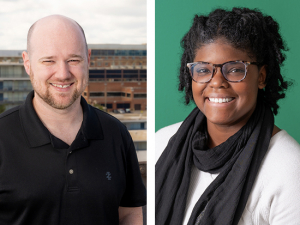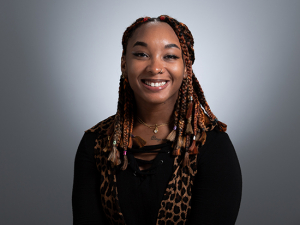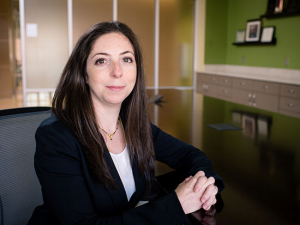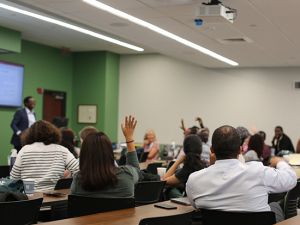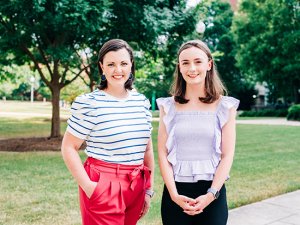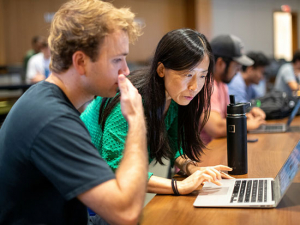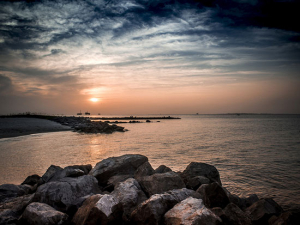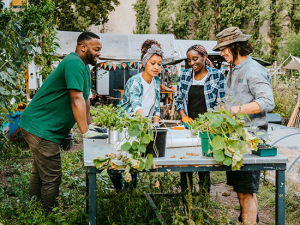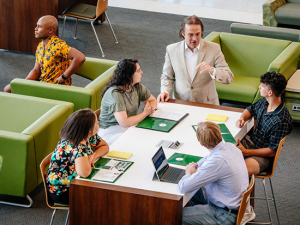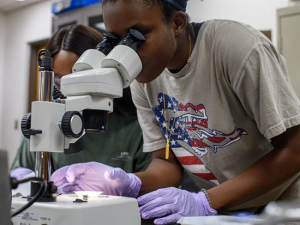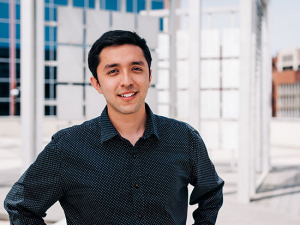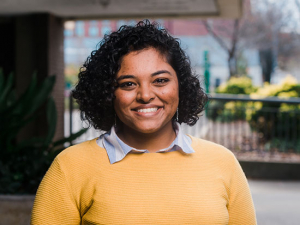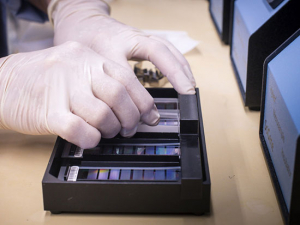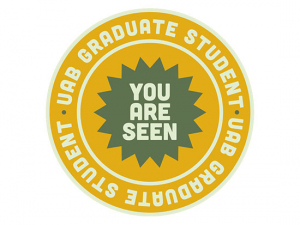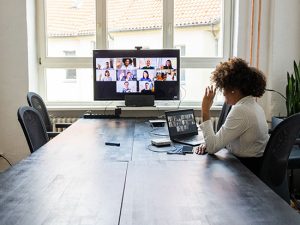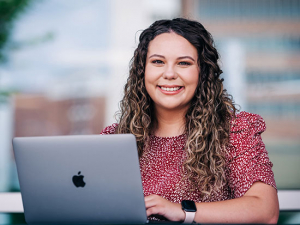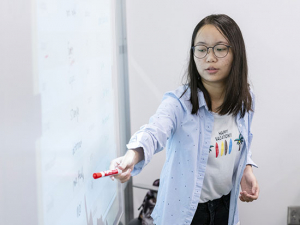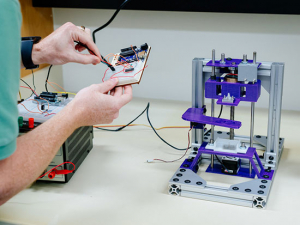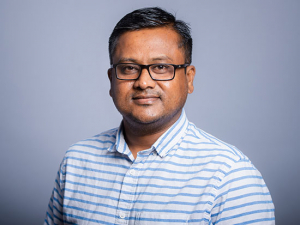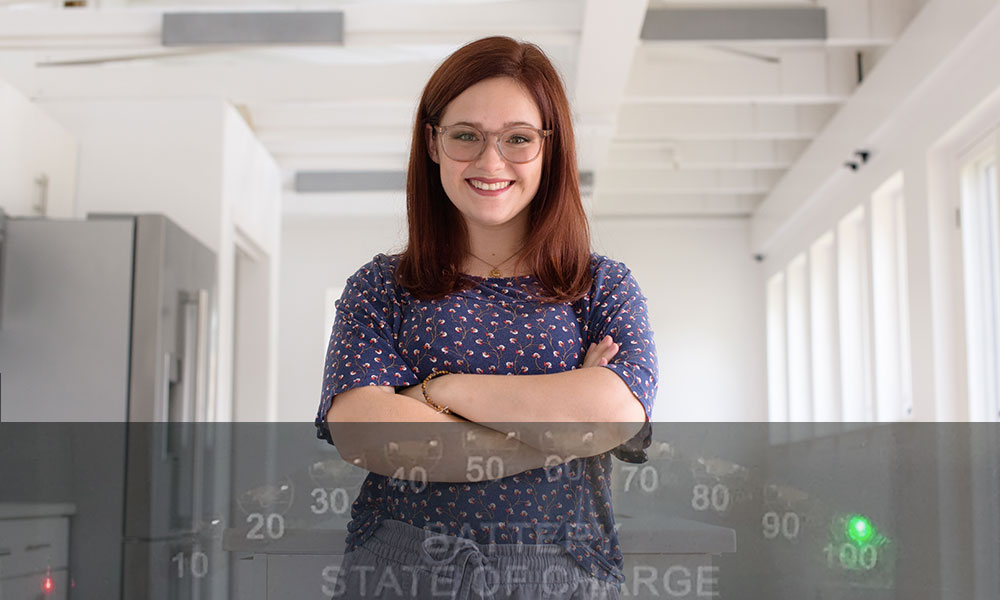
Abigail Franks at the Solar Decathlon House on UAB's campus. The senior has already mapped out the next five to seven years of her life with the work she put into her successful Udall scholarship application. “Those are really big goals that I never thought I was capable of achieving," she said. "But my mentors have been saying ‘You can do this!’”
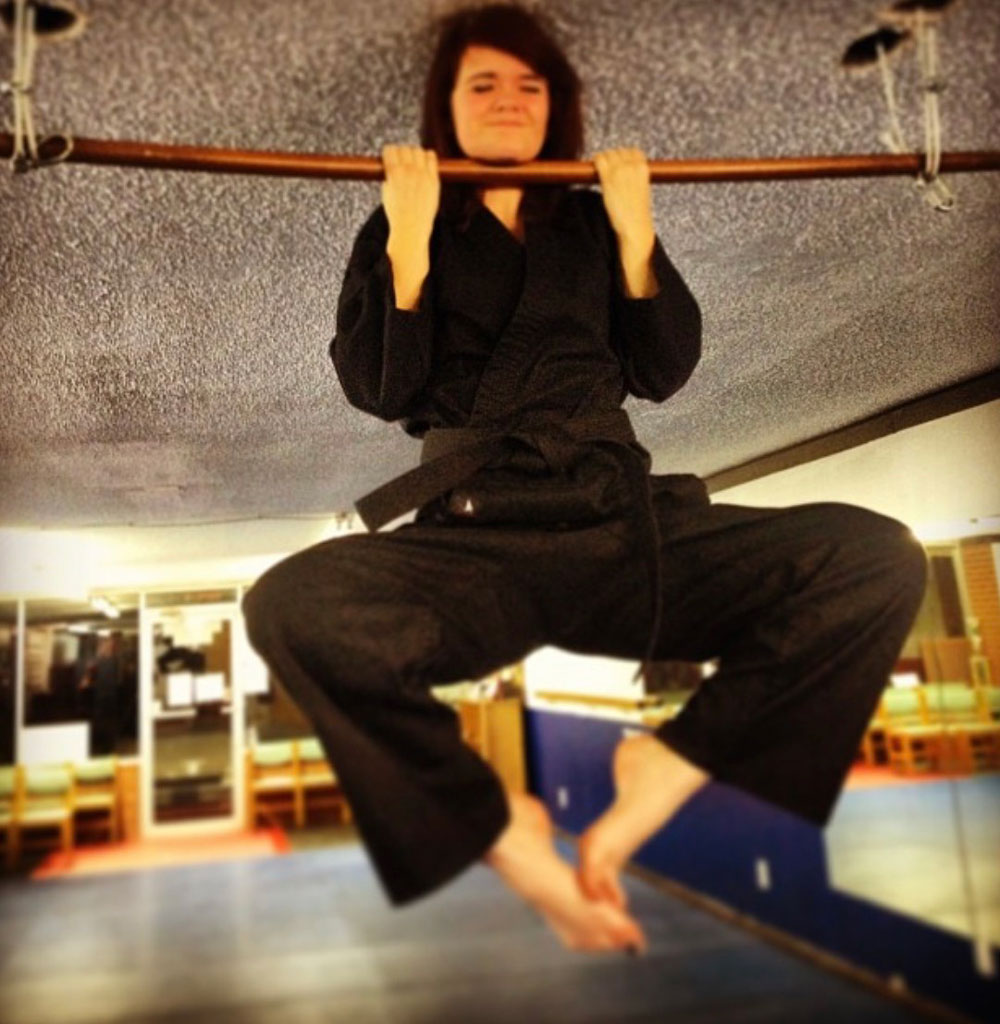 Franks, during mixed martial arts training, before a hip injury forced her to take on other pursuits.When you’re five feet-nothing, alone in a room full of big shots, it helps to have something on your side to alter the balance of power. So, when she finds herself in this situation, Abigail Franks casually mentions her experience — in cage fighting. “It’s funny to see the look of shock on their faces,” she said. “It sets some ground rules: ‘I may be small. But so is dynamite.’”
Franks, during mixed martial arts training, before a hip injury forced her to take on other pursuits.When you’re five feet-nothing, alone in a room full of big shots, it helps to have something on your side to alter the balance of power. So, when she finds herself in this situation, Abigail Franks casually mentions her experience — in cage fighting. “It’s funny to see the look of shock on their faces,” she said. “It sets some ground rules: ‘I may be small. But so is dynamite.’”
Boardroom jujitsu is not normally the concern of college students. But Franks — a senior majoring in political science with a minor in peace, justice and ecology — has turned a passion for the environment and a penchant for dogged investigation into a busy schedule. She helps advise UAB administrators and the City of Birmingham’s Planning Design Team on solar power policy. As the founder of WEARE (We Envision Alabamian Renewable Energy), she has presented to university classes around the state and to citizen groups, including a session organized by the Birmingham law firm Baker Donelson. She tells them that Alabama, with its regular, strong sunshine, could be a leader in solar energy and create tens of thousands of new jobs. Instead, it ranks 49th, with a range of policy obstacles hindering solar adoption.
Rays of light
Franks’s position as sustainable policies intern for the UAB Sustainability program “didn’t exist until I applied for the job,” she said. But when Sustainability manager Julie Price, Ph.D., saw her experience and passion, “she came up with it.” During the past year, Franks’s research helped determine the university’s ambitious goal of getting 20 percent of its energy needs from sustainable energy by 2025.
Working in the learning placeIn this series, UAB Reporter explores campus internship programs — in areas of strategic interest — through the eyes of the students, staff and faculty who make them successful. |
Solar panels are popping up around the Southside, including power phone-charging stations outside the Hill Student Center and UAB Facilities vehicles. There is a 100-panel demonstration project, one of the largest in Birmingham, on top of the UAB Recreation Center, which supplies 10 percent of the busy facility’s power, Price said. And the SURVIV(AL) House, created for the U.S. Department of Energy’s Solar Decathlon competition in 2017, is now a testbed for low-energy solutions on campus.
But major advances will require innovations on a large scale, Price said. “We want to invest in local renewable energy and remove non-renewable energy from our grid where possible. Abigail has done a great job to find examples of university-utility partnerships and understand the policy environment. She’s a force of nature. We are thrilled with her tenacity.”
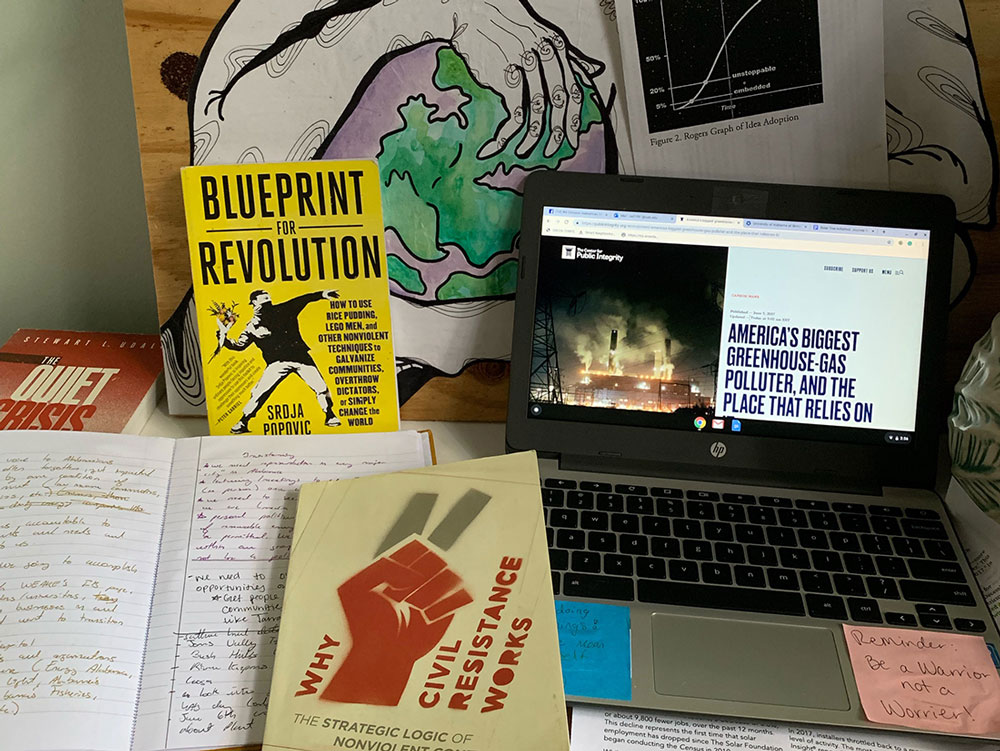
Motivational stickers, inspiring books and lots and lots of notes: a glimpse at Franks' desk.
The grand strategy
From a paper-covered desk in her house, Franks is building a case for the viability of solar power in Alabama — and the power of nonviolent movements to mobilize for major change. Sometimes this involves dramatic moments, like when she was shouting into a megaphone on the capitol steps in Montgomery, or rousing a “docile grandmother” to anger, and action, over environmental injustice. Generally, though, her work is a slow accumulation of data points and connections.
“I spend most of my time reading — going to libraries, searching databases,” Franks said. “I relate very deeply to Hermione Granger from Harry Potter.” And like that wizard, who discovered many powerful spells in the Hogwarts library stacks, Franks has big plans to turn her studies into lifesaving action.
In fact, it’s a grand strategy. She originally wrote it as an assignment for a class called The Power of Nonviolence, taught by Douglas Fry, Ph.D., a leader in the field of peace studies and chair of the UAB Department of Anthropology. “He is an exceptional, life-changing professor,” Franks said. “It was only supposed to be a few pages, but mine was 20 pages.”
Stars of the show
She isn’t ready to reveal all of her moves, but they are clearly compelling. In May, Franks was selected as UAB’s second recipient of the Udall Undergraduate Scholarship, one of only 55 students chosen nationally. (See Franks react to the news in the video above.) “Abigail is a determined, bright and indefatigable young environmentalist,” said Ashley Floyd Kuntz, Ph.D., director of the director of National and International Fellowships and Scholarships, in making the announcement. “Abigail knows that transformational change requires educating citizens, building consensus and then mobilizing people to exercise their civic voices. She will make the Udall Foundation proud.”
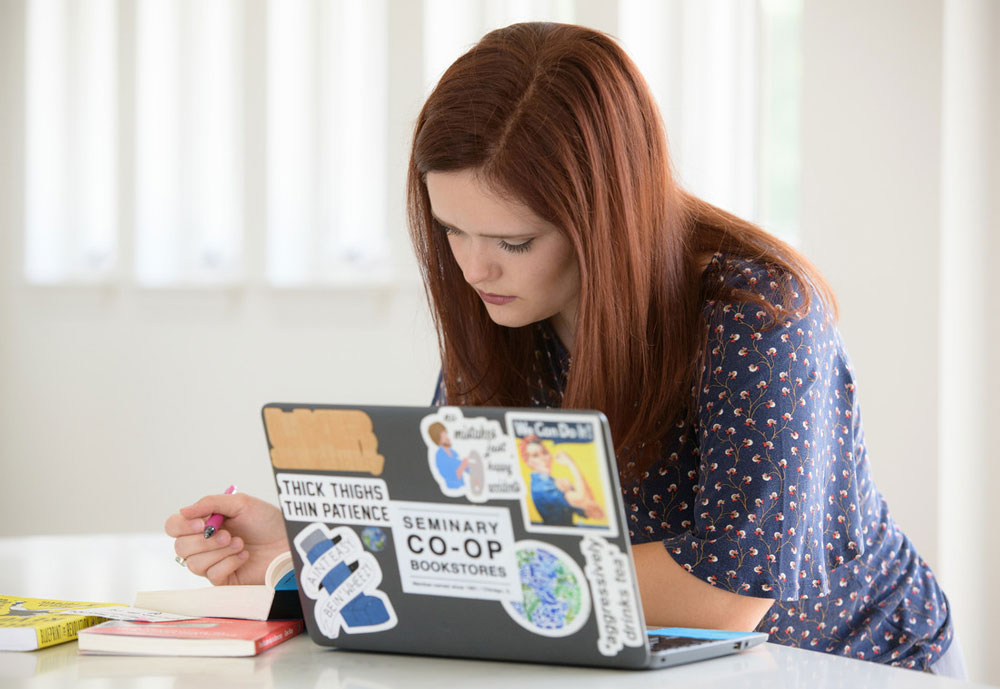
“Students like Abigail are inspiring, and it’s one of the best perks of my job that I get to watch them grow more confident as they realize their own potential," said Michelle Cook, assistant director of National and International Fellowships and Scholarships. "UAB students sometimes don’t understand that they are elite, too — these students really are going to change the world.”
The prestigious award will pay Franks’s living and educational expenses for a year. “It’s such a blessing,” she said. “I work two jobs; this means I’ll be able to work less on my serving job at night to focus more on my studies.” It also means “I’m now part of an environmental network with access to the absolute stars of the show in environmental policy,” she added. “I get one-on-one contact with some of the biggest players in the nation.”
As part of her Udall application, Franks had to “plan out the next five to seven years of my life,” she said. After she graduates, she plans to get a master’s degree in environmental policy. “I’m looking at schools like Columbia University, one of the few in the United States that has a program, and also internationally to schools like the University of Edinburgh,” Franks said. “Those are really big goals that I never thought I was capable of achieving, but my mentors have been saying ‘You can do this!’”
“Students like Abigail are inspiring, and it’s one of the best perks of my job that I get to watch them grow more confident as they realize their own potential,” said one of those mentors, Michelle Cook, Ph.D., assistant director of National and International Fellowships and Scholarships. “For me, it’s helping students see themselves the way their mentors do, helping students realize that there’s power in their journey. UAB students sometimes don’t understand that they are elite, too — these students really are going to change the world.”
Franks’s dreams go farther: a job with an environmental nonprofit after graduate school, working on the local level with affected, vulnerable communities. Then a national position as an expert on regulatory policy. “My dream job is to work as an advisor to the United Nations, to make change on a global level,” Franks said.
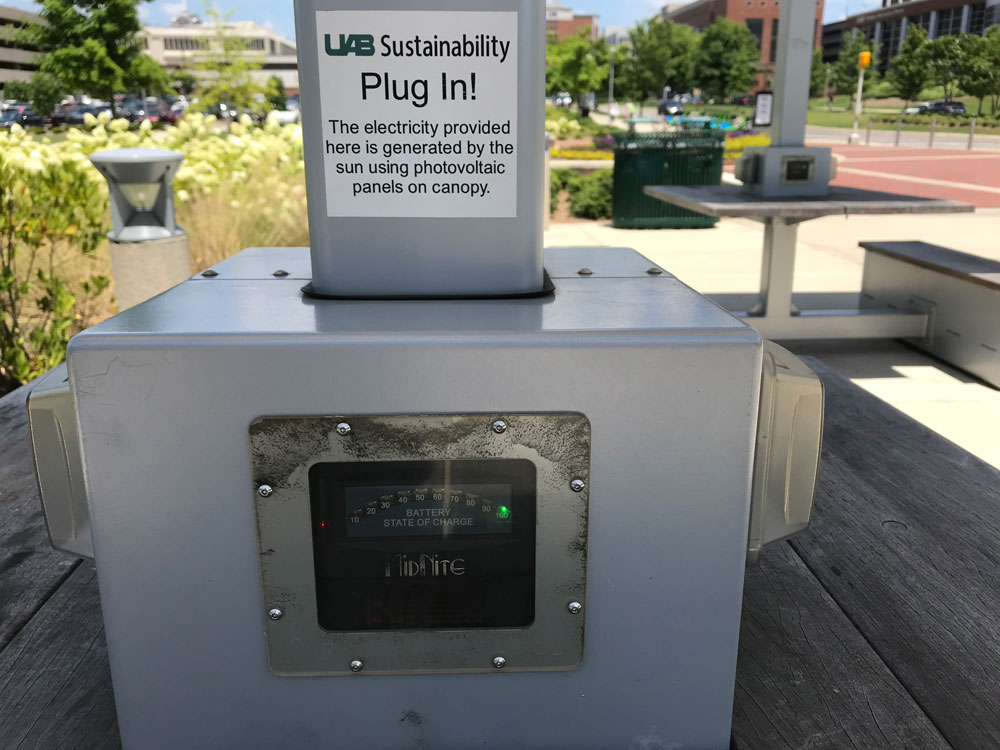
One of Franks' roles as a UAB Sustainability intern was to document the university's sustainability initiatives, including these solar-powered phone- and laptop-charging stations outside the Hill Student Center.
Origin story
All along, Franks knew she wanted to make a difference. But how, exactly? She grew up in rural northern Alabama, 30 minutes south of Huntsville, near a stretch of the Tennessee River so polluted from coal ash runoff and wastewater discharge “that it is basically orange,” Franks said. Open sewage problems and other symptoms of what she now recognizes “extreme environmental injustice” were all around.
In third grade she came across “Recycle this Book,” a collection of essays by children’s authors “informing kids of what was happening to the planet,” and what they could do to help, she said. Franks petitioned the principal of her elementary school to start a recycling program. When he said the school couldn’t take it on, she volunteered to do it herself. A sympathetic teacher allowed her to store a recycling bin in her classroom and Franks carted it away every day after school. “I realized it wasn’t just me and the trailer park I grew up in,” she said. “It was a systemic issue and I couldn’t just sit back and watch it happen.”
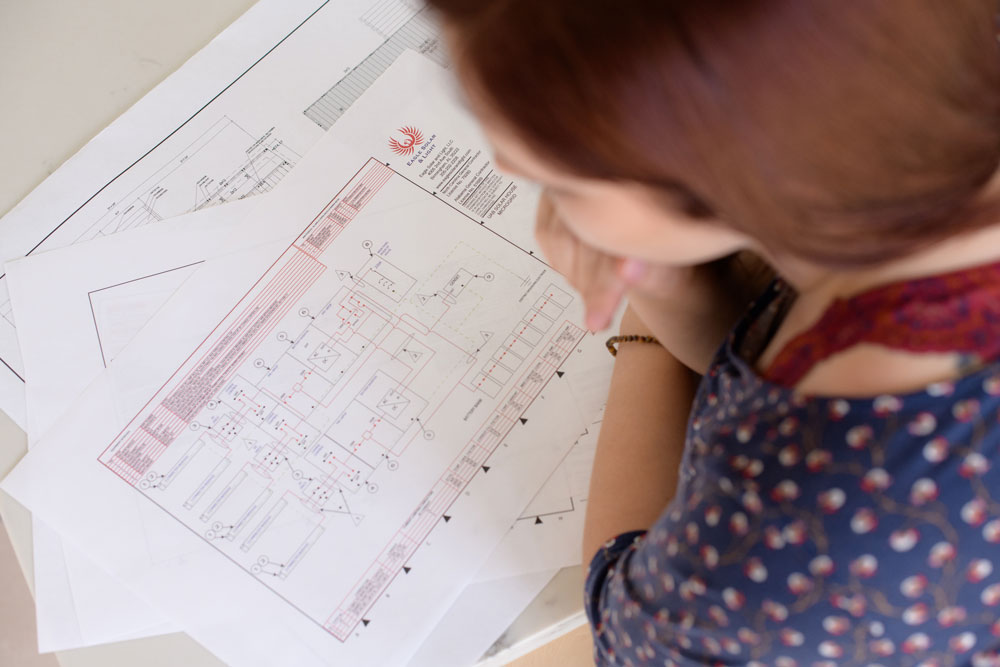
Making things happen at UABStudents often come to Julie Price, manager for UAB Sustainability, and say things like, ‘We need to put a recycling center on the Campus Green!’” she said. “My advice is, take advantage of what’s in place. If you are a student, go to the USGA or SGA and convince them to pass a resolution in favor of your idea. If you are a staff member, you can do the same thing with the Staff Council or go to the Faculty Senate if you are faculty.” Simple steps such as ordering recyclable gloves and batteries, unplugging equipment after use and defrosting freezers helped participating labs in UAB Sustainability’s Green Labs program reduce energy consumption an average 30,000 kilowatt hours in 2017–2018. This summer, Price plans to launch a Green Offices program with guidelines for ways to cut typical office waste. More than 70 Sustainability Ambassadors have volunteered across campus to act as role models and share information in their areas to ensure that UAB is the best possible steward of its resources, both fiscally and environmentally, consistent with UAB’s Shared Values. “People read about climate change and they feel powerless and despair,” Price said. “If it’s important to you, you should speak up.”
|
Passion with purpose
By the time Franks was headed to UAB from Priceville High School, her goal was to work as a federal agent. “I was passionate about everything — women’s rights, child protection, the environment,” she said. But as a freshman, “I was in an Honors College class called Burning Issues that focused on homing in on what your passions are. And I realized that when I protect the planet, I protect everything and everyone I love. That set me on this path.”
Encouraged by Kuntz and Cook, Franks took advantage of the opportunities around her. Franks was one of 27 UAB students selected to attend the Clinton Global Initiative University meeting in Boston in 2017, where she compared notes with more than 1,100 students from around the world who came to share their initiatives for change. “We learned how to raise money, how to connect our passions to specific issues and how to stay motivated,” Franks said. “They also encouraged deep empathy for the ‘other side’; a lot of our discussions were how to connect to people that you don’t get along with.”
She went back to CGIU again in 2018. “I would go up to these people who had changed their states, or their countries, and say, ‘How did you do it?’” Franks said. “They said, ‘You have to make it applicable and emotionally appealing.’”
At the time, Franks was still thinking in a relatively narrow band. She earned an Honors College Presidential Summer Fellowship in 2018 to further her idea of bringing a solar tree to campus. “That’s a free-standing structure whose leaves are solar panels and branches that can be adjusted to catch the sun,” Franks said. “I geek out over it completely and totally.” But as she was doing research on funding a solar tree, Franks explained, she realized that the roots of the solar problem run deep. The obstacles to solar adoption are as much about laws, policies and other structural issues as they are about awareness on the part of consumers, she said.
Suddenly, a solar tree on the Campus Green didn’t seem enough. “I was pacing back and force in Dr. Cook’s office, pulling my hair out,” Franks said. “She said, ‘Well, Abby, what are you going to do about it?’” “It’s hard to shift gears on a project-in-progress,” Cook said. “For Abigail, this shift indicated that she was leaning in to the part of herself that felt empowered to advocacy. She saw an opportunity to use her skills and knowledge to be a more effective agent of change, and she went for it.”
What she did was start WEARE (We Envision Alabamian Renewable Energy), along with fellow UAB undergraduates Sierra Anderson and Nick Ciancio, who launched the UAB Green Labs program as a UAB Sustainability intern. The group’s goal is to educate Alabamians about the importance of solar energy and “campaign for politicians who want to implement solar energy,” Franks said. “The most important thing you can do if you care about sustainable energy and climate change is to demand that politicians fulfill their promises of protecting their community.”
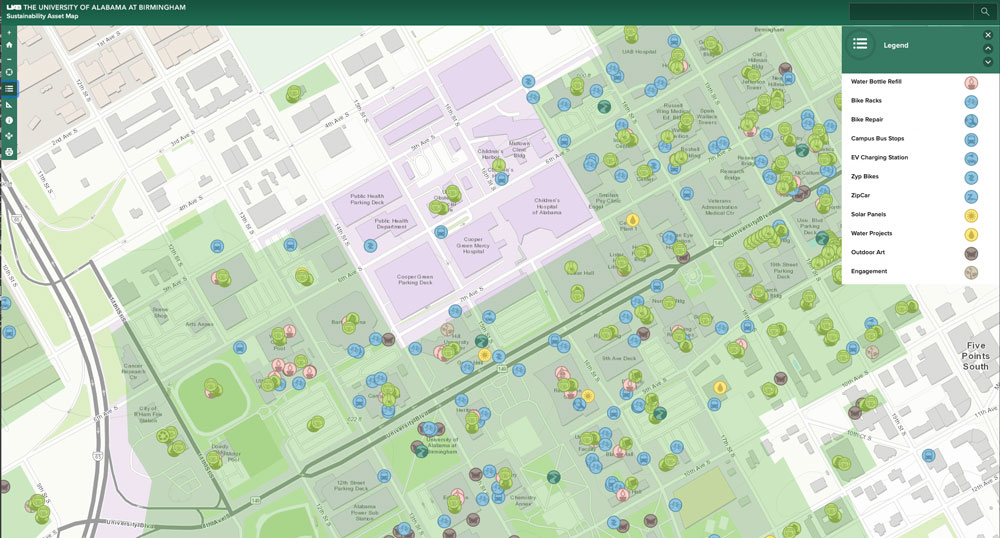
Explore sustainability initiatives across UAB's campus with this interactive Sustainability Asset Map.
Building community in a divided world
Learning how to engage with others is crucial, Franks said. “We want to show that sustainability shouldn’t be a partisan issue. The biggest flaw in political movements is when people are left out. WEARE works with a lot of Republicans. Having a diverse crowd stimulates new ideas and shows that all sides are being told.”
In Fry’s Power of Nonviolence class, Franks absorbed the Rogers Theory of Idea Adoption, which says that “in order for social change to really take hold it has to start off with 5 percent of the population caring about it,” Franks said. “By the time you move to 20 percent it becomes unstoppable. Alabama’s population is 5 million, so we would literally need only 252,000 people to make this idea feasible.”
She realizes that marching and picketing scares some people. “I’ve been listening to a great podcast called Activism for Introverts,” Franks said. “You can do things to support the people who are in the streets. The behind-the-scenes people are the ones who make the scenes go forward.”
Related stories
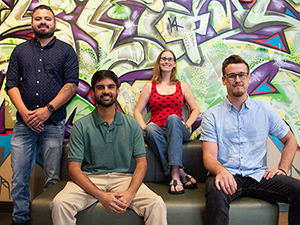
UAB interns are performing real work with real-world results
Campus internships build student resumes and demonstrate they can succeed in the workplace while advancing UAB’s strategic goals.
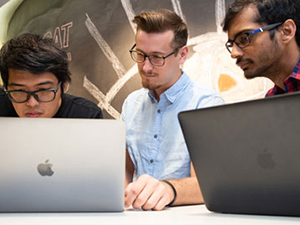
Research Computing interns are hands-on in a world that is always changing
Students who coded significant contributions to program opening access to UAB’s supercomputer are “able to demonstrate that they’ve done some real work.”

UAB interns are performing real work with real-world results

